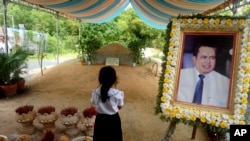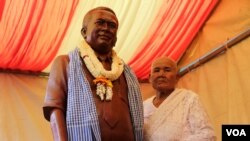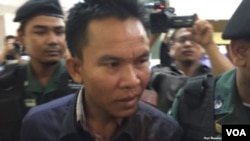A year ago today, Monday, Kem Ley, a prominent political commentator and frequent government critic was shot dead in broad daylight in a Phnom Penh gas station as he was enjoying his morning coffee.
His alleged killer was detained minutes later apparently making his escape, but ensuing court proceedings against Oeut Ang, who infamously gave his name as Choub Somlab in court, which means “Meet Kill” in Khmer, have done little to assuage concerns that the murder was a politically motivated assassination.
Ang claimed the killing was over a $3,000 debt, but evidence of contacts between Ang and officials from the ruling Cambodian People’s Party and the military, the limited mandate of the court hearings, and the release of security camera footage from the morning of the shooting have fueled allegations that there were deeper forces at work. Ang was sentenced to life in prison for the killing.
Long Touch, one of many Ley supporters who came to visit their icon’s grave site ahead of the anniversary of his death, compared the killing with the Khmer Rouge’s political executions. “In the future, there should be no more shooting and dissidents should not be arrested and put in jail,” he said.
Ley was a regular feature of pro-opposition and independent talk radio stations, where he often made comments critical of the government that reached rural parts of the country which the CPP considers its traditional base of support. He had also written a series of satirical short stories poking fun at what he saw as the absurdist power politics he had witnessed take hold in his homeland.
Ley’s mother, Phok Se, 77, said she still “felt regret, every hour and every minute” as she kept watch over her son’s grave.
Kem Rithisith, Ley’s brother who has campaigned for an independent inquiry into the killing, said justice had yet to be served.
“If we look at the justice issue, we don’t get it at all. The trial was not a serious trial. We see that people around the world want to see justice, while our judicial system just brought [Ang] to stand trial,” he said.
“If we analyze the testimony of the killer, justice has not come.”
Bou Rachana, Ley’s widow, fled the country in the aftermath of the killing with her five children. She told VOA Khmer that she did not believe that Ang was the killer of her husband.
“Frankly speaking, I haven’t received justice at all and I don’t acknowledge the man who was sentenced to life in prison because I don’t think he was the killer,” she said. “I also don’t believe he was killed over a $3,000 debt.”
“As we are all aware, the people know that the courts in Cambodia don’t provide justice to the victims and innocent people,” she added.
Ley’s killing garnered international media coverage, with Qatari broadcaster Al Jazeera uncovering evidence that Ang had been recruited by military officials just weeks prior to the killing.
Major rights groups such as Amnesty International and Human Rights Watch have called for further investigation of the case.
Gen. Khieu Sopheak, interior ministry spokesman, claimed the authorities had investigated all leads in the case.
“Let them say whatever they want to say, but we already collected evidence and everything else for the case and sent it to court,” he said. “The court charged him [Ang] and sentenced him and the court confirmed the investigation of the case is ongoing.”
Ly Sophanna, a court spokesman, could not be reached for comment.












